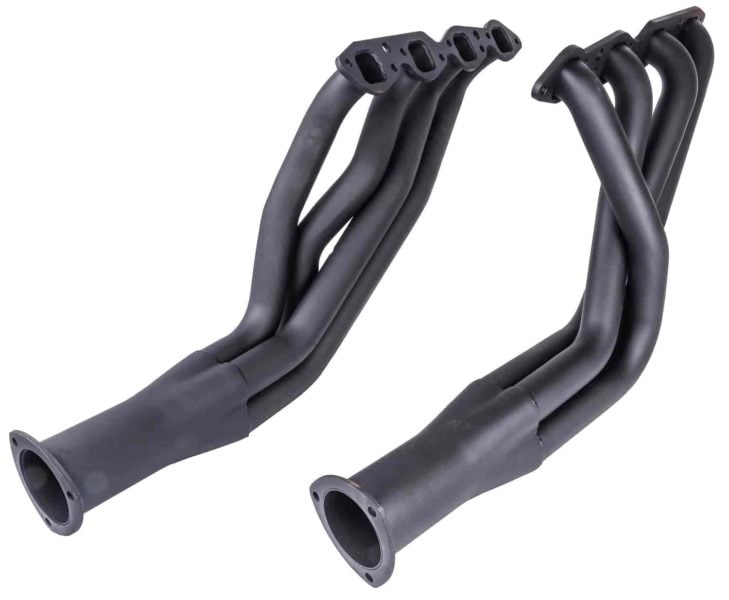
Since its 1964 debut, the Mustang has remained in constant production, building a solid reputation among performance enthusiasts and daily drivers alike for its powerful and reliable engines.
Yet, no matter if you’re behind the wheel of a 60s Boss 302, a mid-00s Pony, or the latest GT500, if you aren’t using the right oil for your Mustang, you’re jeopardizing not just its performance but also its longevity.
Thankfully, JEGS is here with a detailed oil-selection guide covering everything you need to know to choose confidently.
We’ll first explore the role oil plays in an engine so you better understand its importance. Then, we’ll review the oil requirements for a Ford Mustang, including oil type, capacity, and viscosity. Finally, we’ll share a few tips to consider when changing the oil in a Mustang.
The Importance of Motor Oil
Motor oil is wildly important to any vehicle powered by an internal combustion engine, and the Ford Mustang is no exception.
Simply put, motor oil helps lubricate your engine's internals to reduce friction. By acting as a protective barrier between its moving parts, oil mitigates the harsh metal-on-metal impacts, minimizing excess wear and tear that could compromise the engine's integrity over time.
Motor oil also plays a key role in your engine's thermal management, helping absorb the heat generated by its operation and distributing it across the system. This helps prevent damaging hotspots from forming and ensures that the engine runs within its optimal temperature range.
What's more, oil also acts as an engine cleaner by capturing and suspending combustion byproducts like dirt, debris, and microscopic metal particles. Without oil, these contaminants could accumulate, causing abrasion damage to engine parts that could cause power loss, decreased fuel efficiency, and increased emissions.

Oil Requirements for Your Ford Mustang
When choosing oil for a Mustang, not just any oil will do; you also need to consider the oil type it requires, how viscous it is, and how much you're adding, all of which we'll cover next.
Oil Type: Synthetic vs Conventional vs Blended
There are three main types of oil: conventional, synthetic, and blended.
Conventional
Conventional motor oil is refined from crude oil. It provides good lubrication and is often less costly than synthetic oil, typically ranging from $20 to $35 per five-quart jug. While usable in most vehicles, conventional makes the most sense in older engines specifically designed for it.
Just note that conventional oil tends to break down faster in high heat, so if you like to frequent the track with your Mustang and push its limits, you might consider another oil type.
Synthetic
Next up is synthetic, which is made from chemically modified petroleum molecules. Its refined structure helps it hold up better at high temperatures, making it a great option for performance models like the Mustang.
What's more, synthetic retains its fluidity better at low temperatures, so if you live somewhere cold, the engine is less likely to struggle when starting up on a chilly morning.
The downside to synthetic is its cost, which usually runs between $35 and $65 per five-quart jug. If you can afford the premium, synthetic is the best option for most modern engines.
As for older engines, which tend to have wider tolerances between parts, the smaller molecular structure of conventional oil may actually cause it to leak.
Blended
Last but certainly not least is blended motor oil. As its name implies, blended is a mix of conventional and synthetic oil. It retains a synthetic's improved temperature stability and lubrication while keeping costs closer to a conventional, around $25 to $50 per five quarts.
Ultimately, blended is a great middle-ground for classic or modern Mustangs, but if you're driving a newer model and often push it to its limits, a full synthetic will help it perform best.

Oil Viscosity
A motor oil's "viscosity" refers to its resistance to flow, or simply, how thick it is. For instance, a lower-viscosity oil is thinner and flows more easily, while a higher-viscosity oil is thicker and resists flow. When choosing the right oil viscosity for your Mustang, you'll want to consider both your driving habits and the climate you typically drive in.
Thankfully, there's a universal grading system set in place by the Society of Automotive Engineers (SAE) that makes understanding an oil's viscosity characteristics easier for consumers.
Look at a quart of motor oil, and you'll see something like 5W-30, for example. The first number (before the "W," which stands for "Winter") shows the oil's low-temp viscosity, specifically at 0°F (-17.80°C). Lower numbers mean it offers better flow in cold conditions.
The second number refers to the oil's resistance to thinning at high temps, in this case, 212°F (100°C). Higher numbers indicate better resistance to thinning at high temperatures.
A classic Mustang from the 60s or 70s, for instance, might benefit from a thicker oil like a 10W-40, given the wider tolerances in those older engines. However, most modern Mustangs, like the GT or Shelby models, often require 5W-20 or 5W-30 oil, which both strike a good balance between cold start protection and high-temp performance.
If you want your Mustang to run its best, you should stick with the viscosity rating recommended by Ford, which will be what the car was designed for. You'll find the recommended viscosity ratings either on the top of the oil cap or in the owner's manual.
Oil Capacity
Oil capacity refers to how much oil your Mustang's engine can hold. Overfilling can lead to excessive pressure and potential engine damage, while underfilling can cause inadequate lubrication, leading to accelerated wear and tear and reduced performance.
For most Mustangs, the required oil capacity ranges from 5 to 10 quarts, depending on the model and engine size. For instance, a classic 1965 Mustang with a 289 engine has an oil capacity of 5 quarts, while a 2023 GT with a 5.0L V8 requires 10.
As with oil type and viscosity, it's best to consult your Mustang's owner manual for exact oil capacity specifications. Stick to the book, and your Mustang will thank you.

Tips for Changing Oil in a Mustang
- Follow Recommended Oil Change Intervals: The adage of changing your oil every 3,000 miles isn't necessarily applicable for all Mustang years, particularly modern models running synthetic oil, which can last up to 10,000 miles between oil changes. To learn your vehicle's recommended oil change intervals, consult its owner's manual.
- Choose the Right Oil Filter: The oil filter plays a key role in maintaining the cleanliness of your engine's oil, trapping any contaminants that might cause wear and tear. When selecting an air filter, your best bet is to stick with a high-quality oil filter designed for your specific Mustang model. The right filter ensures optimal oil flow, protecting your engine from premature damage and potentially improving overall performance.
- Check the Oil Level Regularly: Regularly checking your Mustang's oil level helps you stay ahead of potential problems, especially if it's an older model without an engine oil monitoring system. To check, remove the dipstick, wipe it clean, reinsert it, then pull it out to read the oil level. Low oil levels could indicate a leak or high oil consumption, which warrants further investigation.
- Always Safely Dispose of Used Oil: Remember, when changing oil, used oil is a hazardous material. After an oil change, collect the used oil in a suitable container and dispose of it responsibly at an approved recycling or disposal facility. Never dump used oil down drains or in the trash.
- Warm Up Your Engine: Before starting an oil change, let your Mustang's engine run for a few minutes. This helps warm up the oil, allowing it to drain more thoroughly and take more contaminants with it. Just ensure the oil isn't so hot that it could cause burns.

JEGS: For All Your Oil Needs
As you now know, choosing the right oil for your Mustang is crucial to maintaining its performance and longevity. Once you've determined the right oil type and viscosity, consider ordering from JEGS, a leading supplier of performance automotive parts.
Still have questions? Contact our team today.





